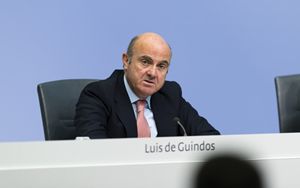(Finance) – In 2023, much progress has been made in containing inflation. However, more needs to be done to ensure a timely and sustainable return of inflation to our medium-term target of 2%. This is what was stated by Luis De Guindos, vice president of the ECBon the occasion of the 14th edition of Investors Day in Spain, after recalling that the inflationary shock faced following the energy crisis was “particularly challenging” and occurred in an already difficult context following the pandemic and the interruption of supply chains global supply chain.
“The Supply-side shocks are particularly difficult to manageand using monetary policy tools”, noted De Guindos, specifying that, instead, “the rstructural shapes they investments aimed at improving the supply capacity of the euro area can contribute to reduce price pressures in the medium term”.
Speaking about inflation, the banker recalled that 2023 ended with an inflation rate just below 3% “which is good news”, but “the high wage pressures, the outcome of the upcoming wage negotiations and the intensification of geopolitical tensions increase uncertainty about the future trend of inflation”. “The decline in 2023 affected all the main components of overall inflation – recalled De Guindos – confirming a widespread disinflationary process which gained momentum in the second half of the year”.
For the number two of the Eurotower it is also “The rapid pace of disinflation observed in 2023 is likely to slow in 2024 and stop temporarily at the beginning of the year, as happened in December 2023.”
As for the‘economic activityDe Guindos confirms that the slowdown has so far been limited and gradual, but the most recent data indicates that the future remains uncertain and the outlook is leaning downwards. “Economic activity in the euro area slowed slightly in the third quarter of 2023. Weak indicators signal an economic contraction also in December, confirming the possibility of a technical recession in the second half of 2023 and weak prospects for the short term”, said the vice-president of the ECB, adding that “”the labor market continues to be particularly resistant to the current slowdown”, even if “the first signs of a correction are visible”.
“We believe that the current level of interest ratesmaintained for a sufficiently long period, will make a substantial contribution to the timely return of inflation to our target”, said the Vice President of the ECB, recalling “interest rates are our main tool for defining the direction of monetary policy. Our future decisions will continue to follow a data-dependent approach to determine the appropriate level and duration of restriction.”
De Guindos, finally, has the agreement on the new Stability Pact was welcomed “with great favour”. of the EU, achieved a few weeks ago. “It is – he underlined – a powerful signal for the markets, since reduces uncertainty on tax rules in the EU. The reformed framework will contribute to finding a balance in public finances, ensuring sufficient debt reduction, on the one hand, and space for reforms and investments on the other, while supporting counter-cyclical fiscal policies.”
